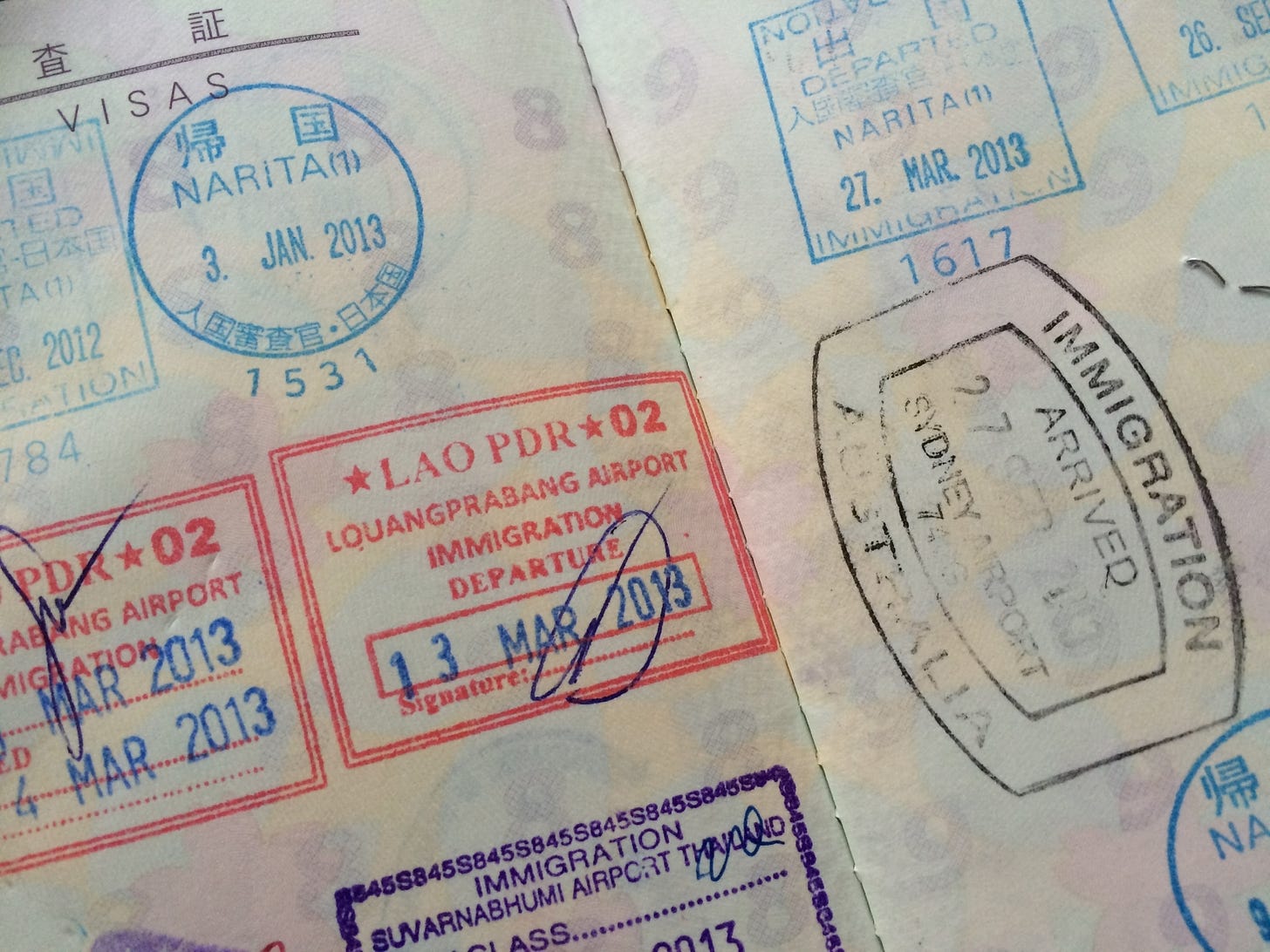

Discover more from Real Gaijin
Attention Global “Techpats” - Japan to Open Doors with New Digital Nomad Visa
While details of the application process have yet to be announced, Japan's new digital nomad visa is likely to attract talent from overseas.

What’s new: A Real Gaijin reader recently asked about the new digital nomad visa coming soon from the Government of Japan. First of all, thank you for the question. This person, a fellow American, wants to explore Japan for an extended period while working remotely. As such, he seems to be an ideal candidate for the new digital nomad visa.
While the parameters of this new visa program are still unclear, it seems like a promising opportunity to explore the country for those interested in Japan. In essence, the program has the potential to be a good way to "dip your toes in the water" and test out life in Japan for a few months while still earning an income.
Definitions: To ensure a common understanding of the facts as we know them today, please take a moment to review the following:
Digital Nomad: A digital nomad is a worker who uses the internet to work freely in different locations without being tied to a specific base or traditional offices. Digital nomads typically work in IT, marketing, and management consulting. They tend to be high income earners.
Designated Activities: The Japanese government has announced its intention to add a new residence status to the visa for "Designated Activities," or tokutei katsudo (特定活動) in Japanese, to allow overseas digital nomads to work in Japan for up to 6 months. The goal is to implement this system from some point in 2024, allowing foreign individuals to work remotely while traveling throughout the country.
Eligibility Criteria: Applicants must be foreign nationals from countries or regions that have a tax treaty with Japan, have an annual income of at least 10 million yen (approximately US$67,750), and be enrolled in private health insurance. This applies to people from approximately 50 countries and regions. Those with spouses and children will be able to bring them to Japan, too.

Yes, but: The proverbial "devil is in the details" is, however, likely to apply in this case. Please, therefore, note the following:
How to Apply for the Visa: The details on how to apply, etc. have NOT yet been announced by the Japanese government. As of today (March 14, 2024), the "Visa and Travel Information" section of the Embassy of Japan in the United States of America's website had NO published information about the upcoming digital nomad visa program. Check back here or on the Japanese government website in your own country for updates: https://www.us.emb-japan.go.jp/itpr_en/travel_and_visa.html#types
There are also no details about how long it will take to get approval. It is highly likely that the approval process will not be something that can be completed in just 24 hours, for example, but we may all be pleasantly surprised.
It is also unclear at this time whether it would be possible (1) to renew the new digital nomad visa, and if so, for how long and/or how many times, and (2) to change your visa status while remaining in Japan.
Tax Filing Procedures: Unless there are no local filing requirements in Japan or the Japanese tax authorities develop a streamlined process for filing paperwork, digital nomad visa holders will, most likely, have to plan on paying a tax advisor (probably one based in Japan) to assist with local tax filing in Japan. Such services will probably not be free.
Private Medical Insurance: This is another wildcard. A good resource is https://www.internationalinsurance.com.
"The cost of health insurance in Japan depends on many factors, primarily your age, the level of coverage you want, and the plan you choose. The cost for a 45-year-old single male with a Cigna Global plan ranges from $200 to $500 per month, depending on the benefits you choose and your country of citizenship." - International Insurance.com
There are several insurance companies that offer policies, including Cigna Global and GeoBlue. It is likely that these companies will develop services specifically for people with digital nomad visas from Japan, but the details have yet to be made public.
Context: Currently, there is no residency system for digital nomads, and they must stay in Japan under the 90-day "short-term stay" status, which technically does not allow them to work. A temporary visitor visa only permits sightseeing, business meetings, and conferences, but not for remunerative activities. The business community and others have called for the creation of a special status, and in the "Grand Design and Action Plan for New Capitalism" (「新しい資本主義のグランドデザインおよび実行計画」), adopted in June 2023, the central government proposed the creation of such a system by the end of the current fiscal year, which runs through the end of March 2024.
This initiative is a tactic of the broader strategy calling for a "digital revolution," as advocated by the Japanese government.
In the latest "Global Digital Competitiveness Ranking" released last year by the International Institute for Management Development (IMD) in Switzerland, Japan fell far behind the rest of the Group of Seven (G7) major economies, dropping nine places to 32nd. The ranking assesses 64 countries on their readiness to adopt digital technologies for economic and social transformation. Compared to its Asian neighbors, Japan lags far behind, with Singapore in third place, South Korea in sixth, Taiwan in ninth, Hong Kong in tenth, and China in 19th. Thus, Japan’s new digital nomad visa program is designed to help leap-frog the country into a more competitive position.
The number of countries offering digital nomad visas has skyrocketed since the outbreak of Covid, and many remote workers around the world are embracing the idea of working independently from any location. Today, 17.3 million U.S. workers consider themselves digital nomads, according to a report released last year by MBO Partners, a U.S. firm that places independent talent with governments and businesses.

Why it matters: The new digital nomad visa will allow Japan to become more competitive. The new residency status is intended to attract talented, high-value workers to Japan and to stimulate the Japanese economy.
"The new system will be a source of innovation." - Ryuji Koizumi, Minister of Justice of Japan
It has the potential to be a big step forward in a country that has a history of being cut off from the rest of the world for nearly 300 years and has remained fearful of allowing widespread immigration. Some may view this program as "too little, too late" or simply a baby step toward globalization, but it is likely to attract valuable talent, which should end up being a positive for Japan.
By the numbers: There is a lot of information available about the significant number of global digital nomads out there. Their numbers are already large enough to make up the population of a large country. Recent survey results reveal the following:
Overall Number: There are an estimated 35 million digital nomads in the world - most of them highly educated. This number is expected to grow to 1 billion workers in the next decade.
Ethnic Background: 76% of digital nomads are Caucasian (of European descent). This is followed by Latinos and Hispanics (10%), Asians (8%), and Africans (6%).
Nationality: The United States was the most common nationality, followed by Portugal, Germany, and Brazil, with the top four countries accounting for half of the total.
Gender: Men and women were split 50-50.
Age: By age group, those in their 30s account for the highest percentage at 46.5%, followed by those in their 40s and 50s, while those in their 20s account for only 13.9%, which may seem surprisingly low. About two-thirds (64%) of digital nomads are Millennials (37%) and Gen X (27%); Gen Z, born between 1997 and 2012 and already adults, make up one in five (21%) of digital nomads.
Job Categories: The top job category is marketing. This is followed by IT and software development, digital designers, writers, copywriters, and those working in e-commerce.
Visa Availability: Digital nomad visas are currently offered by more than a dozen countries. The movement to attract digital nomads to their countries for economic development and technological innovation began in Europe, where Estonia, known as an IT powerhouse, introduced a "digital nomad visa" in July 2020, ahead of other countries. Estonia was followed by the Czech Republic, Germany, Spain, Iceland, and Portugal. Outside of Europe, digital nomad visas are now available in Indonesia, South Korea, and Thailand in Asia, the United Arab Emirates in the Middle East, and Colombia and Argentina in Latin America. South Korea introduced its digital nomad visa in January this year. The annual income requirement was set at 84.96 million won ($65,000) or more, which is twice the gross national income on a per capita basis. The maximum duration of the program is two years.
Most Popular Destinations: Mexico was the most popular destination, followed by Thailand, and Portugal. Countries with warmer climates and resort destinations tend to have the highest demand.
Length of Overseas Travel: On average, digital nomads responding to the survey had been traveling for 6.1 years, with more than 60% staying in one place for 3 to 6 months.
Income: The collective value of their income is estimated at 110 trillion yen ($787 billion). Digital nomads have an average annual income of 17 million yen ($115,000) per person.
Going deeper: For more information, a good place to start is to register for free with the Japan Digital Nomad Association (日本デジタルノマド協会 https://japandigitalnomad.com/en). This organization provides an online forum with FAQs and on-boarding support.

Commentary: As a long-term foreign resident in Japan, I have had many types of visas over the years, first to study and then to work in Japan. Now I enjoy permanent residency status, but of course that was a long time coming.
For Japan, the proposed digital nomad visa should be a great way to attract much-needed, highly-skilled talent. The "trick" will be to ensure that the country is able to leverage digital nomads for the benefit of both the local economy and society at large.
For the reader who originally posed the question, as well as any other existing or aspiring digital nomads, Japan would be an ideal location to combine business with pleasure. The country's rich cultural heritage (and abundance of Starbucks and WeWorks) would provide a wonderful opportunity for personal enrichment for anyone seeking an extended "workcation" or sabbatical. Who knows? It might lead to a desire to change visa status to stay longer. It might even lead to a romantic relationship with a local resident who could help you change to a spousal visa, for example.
In any case, I recommend taking this opportunity to explore beyond the major metropolitan areas of Tokyo, Osaka, and Nagoya. There is a lot to do in the Japanese countryside, and you will most likely find plenty of opportunities to interact with the locals. It would be significantly less expensive, too.
Since you will need a place to stay, you might want to check out ADDress1. You will probably need the help of a Japanese speaker to navigate the site which is still only available in Japanese, but it is worth it. Unlike an Airbnb or a regular hotel room, this service has a network of more than 300 re-purposed homes across the country where you can rent a bed (and sometimes a private room) in exchange for a ticket. They have a variety of plans, including a book of 30 tickets for only 99,800 yen ($675). This would be a great way to experience life in regular neighborhoods all over Japan. Just a suggestion…
What's next? The next step is to wait for the Japanese government to announce the details of its new digital nomad visa. Depending on your comfort level as an early adopter, you may want to wait a while even after the initial launch of the program to allow for any kinks to be worked out.
What do you think? So, are you ready to apply to become one of Japan's first incoming digital nomad visa holders? All answers are completely anonymous - even to the author.
Links to Japanese Sources: https://www.jiji.com/jc/article?k=2024020200312&g=soc, https://news.yahoo.co.jp/articles/48a035846a86767e1be5c043976752f4e2a466e6, and https://jbpress.ismedia.jp/articles/-/79382.
#digitalnomad #digitalnomadism #remotework #foreigner #techpat #workcation #sabbatical #coworking #デジタルノマド #デジタルノマドビザ制度 #短期中期滞在者 #特定活動 #リモートワーク #在留資格 #外国人 #デジタル革命 #テレワーク #旅人 #コワーキング
Please note that you can subscribe to Real Gaijin for free. If you are so inclined, you can also purchase an annual subscription for a relatively small fee.
However, I understand that even the lowest level of annual subscription allowed by Substack may seem too high for many. If you just want to buy a coffee for Real Gaijin (or maybe a green tea), you can also make a small donation here:
https://buymeacoffee.com/realgaijin
All levels of support - including just liking a particular article and/or leaving a comment - are very welcome. Thanks again for reading.
While Real Gaijin lives in Substack, you can also find Real Gaijin on a few other platforms (listed in alphabetical order).
https://www.instagram.com/real_gaijin_on_substack/
https://www.threads.net/@real_gaijin_on_substack
https://www.tiktok.com/@real.gaijin
https://www.youtube.com/@RealGaijin
https://www.linkedin.com/in/mark-kennedy-5b50b71/
To be clear, according to the website of ADDress, “As an option to the 30-ticket plan, we offer a 60-ticket plan for ¥199,600/month (tax included). If you want to stay for an entire month with ADDress alone, if you sign up for the 30-ticket plan in the first month, you will use up your 30 reservations during the first month and will not be able to make reservations for the following month until you are given new tickets on the first of the following month. By signing up for the 60-ticket plan for the first month only, you can secure reservations for the following month. (From the following month, please switch to the 30-ticket plan.)” ADDress offers a variety of plans, and these two long-term plans are simply two of the available options. You can also try out the service for only a few nights for much less money.
Subscribe to Real Gaijin
Unveiling the Real Japan: An American Expat's Inside Look | Hot takes, commentary, and unfiltered insights on life as a foreigner in Japan.























Not much incentive to get a digital nomad visa for Japan, just like South Korea. Only 6 months, high income requirement. Better off getting a startup visa and staying for at least 2 years